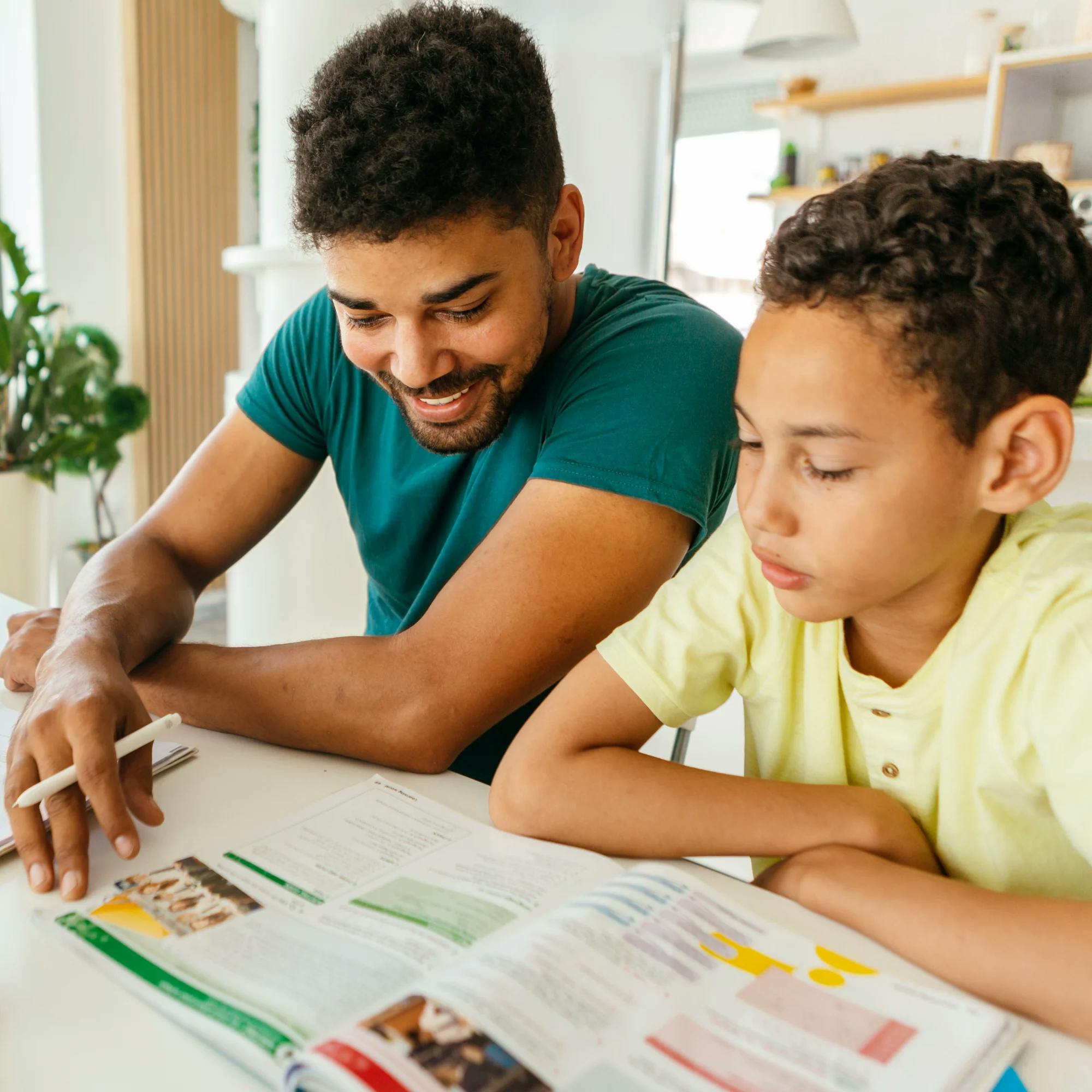Every parent wants to help their child do well in school, and reading abilities are a big driver of school success. But for children with dyslexia, learning to read can be difficult. That can make school much more challenging.
If your child has been diagnosed with dyslexia, you suspect they may have dyslexia, or you’d simply like to know the signs to look for, keep reading. This article explains the causes and symptoms of dyslexia, as well as how speech therapy can help kids with dyslexia become successful readers.
What is dyslexia?
Dyslexia is a learning disability that negatively impacts a person's ability to read. A person with dyslexia has difficulty identifying speech sounds and understanding how they work within words.
A person with dyslexia has a difference in the part of the brain that processes language.
It’s important to know that dyslexia is not related to intelligence. A person with dyslexia has a difference in the part of the brain that processes language. Because of the challenge this creates with reading, children with dyslexia may need special services or tutoring to help them throughout school.
Expert support for your child
Speech therapy can help children with reading, writing, and spelling challenges. Get matched with the right therapist for your child today.
 Get started
Get startedWhat causes dyslexia?
Genetics are believed to play a major role in dyslexia. There are certain genes related to language processing that may predispose someone to dyslexia. Dyslexia is often found to run in families.
Dyslexia is the most common learning disability in both children and adults.
Dyslexia is a common condition. In fact, it affects up to 20% of the population. Dyslexia is the most common learning disability in both children and adults.


Signs of dyslexia to look for
The severity of a person’s dyslexia can range from mild to severe. The age of diagnosis can vary as well, from childhood to adulthood. But early diagnosis makes a big difference. When a diagnosis is made, it allows a child to get the extra support they need in reading and throughout school.
It can be hard to identify dyslexia before a child starts to read, but some signs may be present early on. Let’s look at symptoms of dyslexia in children of different ages.
Signs and symptoms of dyslexia in toddlers and preschoolers
Late talking
Slow vocabulary growth
Problems saying words correctly (reversing sounds, or mixing up sounds that are similar)
Difficulty identifying/naming letters and numbers
Difficulty learning songs or rhyming
Signs and symptoms of dyslexia in school-age children
Reading below expected age range
Problems processing and understanding speech
Difficulty finding the right words when speaking
Difficulty remembering sequences
Problems seeing and hearing differences in letters and sounds
Difficulty sounding out words
Problems with spelling
Taking a long time to finish reading or writing tasks
Avoiding activities that involve reading

Why is it important to diagnose dyslexia?
Without support, children with dyslexia will likely have trouble in school, so it’s important to have your child tested for dyslexia if you have concerns. Again, a dyslexia diagnosis will enable them to get help as quickly as possible.
Diagnosing dyslexia is important for social and emotional reasons, too.
Diagnosis also matters from a social and emotional standpoint. Children who have dyslexia are at a greater risk of developing low self-esteem, anxiety, or aggression, and they may withdraw from relationships. We want to help them get the support they need as early as possible.


How is dyslexia diagnosed?
There isn’t one test that can show if a child has dyslexia. In making a diagnosis, different factors are assessed or taken into consideration. Let’s review some of them:
Developmental and medical history play a large part. That includes any family history of learning disabilities.
Vision, hearing, and neurological tests may be given to ensure problems in those areas aren’t contributing to learning issues.
Reading and academic testing will likely play a role.
Phonological processing as well as reading accuracy, speed, comprehension, and spelling will all be measured.
The child, their parents or caregivers, and their teachers may be asked to fill out questionnaires.
Dyslexia is usually formally diagnosed by a reading specialist or psychologist. Your child’s pediatrician can help you find the right clinician to perform the evaluation.


How is dyslexia treated?
Dyslexia can’t be cured. However, there is effective treatment. Children can receive treatment from a dyslexia specialist. These specialists help children learn letter-sound associations and strategies to improve their reading abilities. Children may be able to receive services through their school, or outside services through centers that treat dyslexia.
Teachers work closely with dyslexia specialists in order to support children with dyslexia in their classroom. In public schools, it’s required that teachers and staff take the means necessary to help children diagnosed with dyslexia. Children with dyslexia often have an IEP, or Individualized Education Plan, in place to support them.
How can speech therapy help with dyslexia?
In addition to working with a dyslexia specialist, speech therapy is also an effective treatment for dyslexia. A speech therapist can help your child build their phonological processing skills. That refers to their ability to identify and understand sounds in our language in order to process spoken and written words. These skills play a large role in reading and writing.
During speech therapy sessions, your speech therapist will engage your child in a variety of activities that target phonological processing. Your child may work on phonological awareness, phonological working memory, or phonological retrieval. Let’s break these down together.
1 Phonological awareness
The ability to understand sounds and how they work together to form words. For example, adding sounds can change the meaning of a word: “car” + “s” = “cars”, meaning more than one.
2 Phonological working memory
The ability to remember words and sounds in the short-term in order to use them during a variety of phonological awareness activities. Your speech therapist may have your child use a word in a sentence or think of words that start with a certain sound. For example, “Tell me all the words you can think of that start with /s/.”
3 Phonological retrieval
The ability to recall letter shapes that represent letter sounds. Your speech therapist will help your child learn to recall the sound formation for letters and letter combinations. One example might be practicing putting your teeth on your bottom lip and blowing air to form the /f/ sound in a word.
The ability to understand and use letter sounds and letter sound combinations is the foundation for understanding written words. This, in turn, supports reading skills.


How can you support your child with dyslexia at home?
It’s natural to want to do all you can for your child. Even if you can’t help them with direct reading tasks all on your own, there are many other ways you can support them!
Encourage your child to learn and try new things. This will help set them up for success in school and dyslexia treatment.
Read–a lot! Practice reading together, and allow them to try reading with you. Children benefit from having a supportive environment to practice challenging tasks.
Talk to your child’s teachers and specialists to find out what you can do. The more you practice at home, the more quickly your child may make progress.
Give your child a lot of encouragement and praise. Even if a task is hard for them, there’s always something you can praise them for. Saying things like, “You are trying so hard–I know you’ll get it soon!” or even simply “I’m so proud of you!” can make all the difference. Never underestimate how much your emotional support can help your child.
You’re already supporting your child simply by researching this information. The more you know, the closer you are to getting your child the resources they need. Get ready to watch them grow and thrive!
How Expressable Can Help
Concerned your child isn't reaching age-expected milestones? Looking for communication support from a professional? Expressable is a national online speech therapy practice serving children and adults. We treat all major areas of communication and feeding, offer flexible hours including evenings and weekends, and accept most major health insurance plans. We’re proud to have earned more than 3,000 5-star reviews from our clients (4.9/5 average).
Our therapy model is centered on parent and caregiver involvement. Research proves that empowering caregivers to participate in their loved one’s therapy leads to better outcomes. That’s why we combine live, 1-on-1 speech therapy with personalized education and home practice activities for faster progress.
Communication is more than words. It’s how we share how we feel and show who we are. We’re here to help you or your child do just that.

 Abby Barnes, M.S., CCC-SLP
Abby Barnes, M.S., CCC-SLP









